#Ashifa Kassam
Explore tagged Tumblr posts
Text
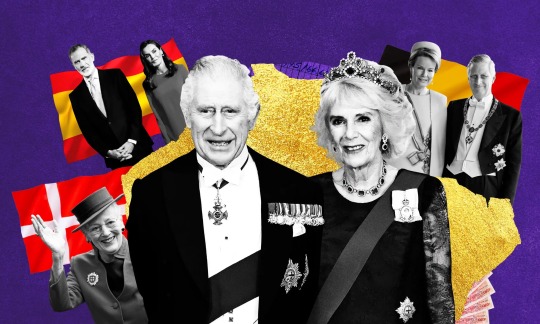
Cost of the Crown: Windsors v Borbones: Comparing the Public Pay of European Filthy Royal Families
Stipends, palace maintenance, staff costs and taxes all differ, but the British royals are given the most taxpayer money
King Charles III and Camilla, the Queen Consort; Denmark’s Queen Margrethe II; Spain’s King Felipe VI and Queen Letizia; and Belgium’s King Philippe and Queen Mathilde. Composite: Guardian Design/AFP/Getty Images/ SOPA Images/REX/Shutterstock/PA
— By Rupert Neate, Henry Dyer and Ashifa Kassam | Wednesday 5 April 2023
Comparing the cost of Europe’s royal dynasties is akin to comparisons between apples and oranges. Each family is unique, and each government has a different way of paying for them. Some royal budgets cover the cost of maintaining palaces, staff and security; others are limited to annual stipends to individual kings or queens.
Tax is paid by some European royals but not others. Some countries are highly transparent, providing detailed breakdowns of how public money is spent on individual royals. Others are more opaque, with royals supplementing an official government lump sum with other quasi-private sources of income. One thing, at least, is clear: European royal families come with vastly different price tags.
United Kingdom 🇬🇧
Members of the British royal family on the balcony of Buckingham Palace for the trooping the colour ceremony in June 2018.
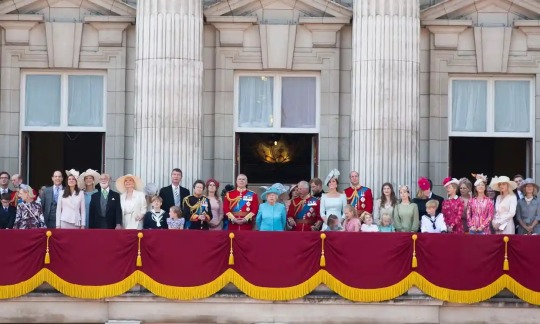
Members of the British royal family on the balcony of Buckingham Palace for the trooping the colour ceremony in June 2018. Photograph: Shutterstock
Family name/House: The Windsors
Monarch: King Charles III
Approximate Public Funding: £86m-£127m
The most famous of Europe’s grand hereditary families, and probably the richest and most powerful too. Many Britons wrongly assume their monarch fulfils purely ceremonial roles, and has no real power. However, an archaic procedure known as “consent” allows the monarch, or heir, to secretly vet laws before they are approved by the elected members of parliament.
It was once used by Queen Elizabeth II to persuade ministers to change the law to conceal her “embarrassing” private wealth from the public.
There is no breakdown of how much individual members of the royal family receive for their official duties. The monarch does receive a lump sum – the sovereign grant –which has risen dramatically over the last decade. The UK taxpayer gave £86.3m towards the cost of the British royal family last year. Of that, £34.5m was spent on refurbishing Buckingham Palace as part of a 10-year restoration programme. The core cost to the taxpayer, for the royal household’s operating costs, travel and maintenance on other residences, was £51.8m.
Controversially, the new king and his heir, Prince William, also receive income from two hereditary estates – the Duchy of Lancaster and the Duchy of Cornwall – which pay no corporation tax or capital gains tax. There has been a centuries-old debate over whether that money – currently more than £40m a year – should really go to the public. Buckingham Palace insists the revenue is “private income” buts says part of it goes towards official duties.
From 1993, the monarch agreed to pay “voluntary” income tax, although they are exempt from inheritance tax, meaning the late queen passed her fortune to the king without any deductions for the public good.
Spain 🇪🇸
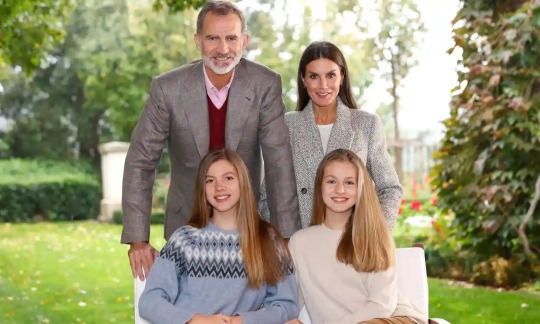
Clockwise from top left: King Felipe, Queen Letizia, Princess Leonor and Infanta Sofia pose for their 2021 Christmas card. Photograph: Zuma/Alamy
Family name/House: The Borbones (or Bourbons)
Monarch: King Felipe VI
Approximate Public Funding: £7.4m
Spain’s royal family ranks among the most beleaguered on the continent. Marred by accusations of corruption, extramarital affairs and a precipitous fall from grace, the former king Juan Carlos I abdicated in 2014 and eventually left the country.
Investigations into his financial dealings were eventually shelved and the former king’s lawyers noted he had been cleared of “any illicit conduct susceptible to criminal reproach”. However, the scandals led to an intense debate among Spaniards about their royal family, who this year will receive €8,431,150 (£7.4m) from the state budget.
Seeking to present a new era of transparency, Juan Carlos’ son, King Felipe VI, made public his personal assets of €2.6m (£2.28m). He renounced his personal inheritance from his father in 2020 and removed him from the royal family’s payroll.
From the public grant, Felipe receives €269,296 (£236,214.10) in an annual personal allowance, while his wife, Queen Letizia, gets €148,105 (£129,911). His mother, Juan Carlos’s estranged wife, Sofía, receives an annual stipend of €121,186 (£106,299). Spanish royals pay tax on their income.
Sweden 🇸🇪
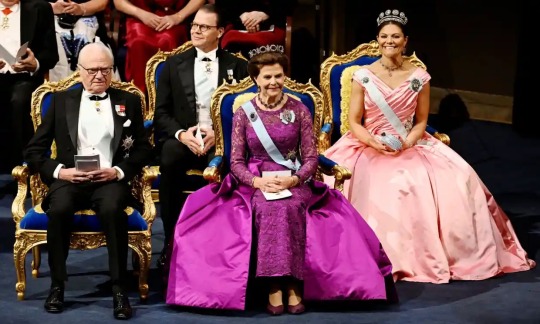
L-R: King Carl XVI Gustaf, Prince Daniel, Queen Silvia and Crown Princess Victoria attend the Nobel prize ceremony in Stockholm in December 2022. Photograph: Christine Olsson/TT News Agency/AFP/Getty Images
Family name/House: The Bernadottes
Monarch: King Carl XVI Gustaf
Approximate Public Funding: £11.5m
Sweden was the first monarchy to change its rules on succession from agnatic primogeniture (the eldest male son) to absolute cognatic primogeniture (the eldest child). The change was passed by the Swedish parliament in 1980, and led to Crown Princess Victoria becoming heir apparent instead of her brother Prince Carl Philip.
The Swedish royal court received a total grant of 147.9m Swedish krona (£11.5m) in 2021 (the latest figure available). Of this, 73.9m kr (£5.8m) covered the cost of the king’s official duties, travel, staff and stables. Within this, 13.6m kr (£1m) was allocated to the king and other titled royals who carry out official duties to cover costs of a “non-official nature which are connected with, or caused by, the royal position”, according to the court’s annual report.
Individually, Carl Gustaf and his wife, Silvia, get 8m kr (£625,423) between them, while Victoria and her husband collect 4.5m kr (£351,800), and Carl Philip and his wife get 1.1m kr (£85,995). In 2019, the king stripped five of his grandchildren of their royal titles in order to reduce the total cost of “appendages” to serving royals.
Belgium 🇧🇪
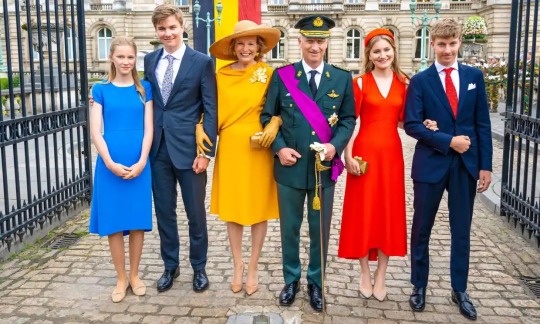
King Philippe and Queen Mathilde with their children (L-R) Princess Eléonore, Prince Gabriel, Crown Princess Elisabeth and Prince Emmanuel at 2022 National Day celebrations in front of the Royal Palace in Brussels. Photograph: Rex/Shutterstock
Family name/House: Van België, De Belgique, or Von Belgien (or “of Belgium”)
Monarch: King Philippe
Approximate Public Funding: £12.5m
Like the British royals, the Belgian monarchy ditched its previous surname, Saxe-Coburg-Gotha, in 1920 in response to fierce anti-German sentiment after the first world war. The new name – van België (Dutch), de Belgique (French) or von Belgien (German) – means “of Belgium” in the country’s three official languages.
The Belgian monarch has had no direct power since 1951, although the king has kept the right “to be consulted by his ministers, to encourage them, and to caution them”.
King Philippe, or Filip, is granted an annual civil list to cover the cost of performing official duties. The amount is established at the start of each reign. Philippe, who acceded to the throne in 2013, received €12.5m (£11m) in 2021, according to the Belgian government’s latest report. The amount is set to increase with the consumer prices index measure of inflation. As well as the £11m paid to Philippe, other members of the royal family receive yearly “emoluments”. Philippe’s father, King Albert II, who abdicated in 2013, receives €980,000 (£862,635); Albert’s eldest child, Princess Astrid, receives €341,000 (£300,161), slightly more than her younger brother, Prince Laurent, who gets €327,000 (£287,838). Their half-sister, Princess Delphine, who had Albert’s paternity recognised by the court in 2020, does not receive any royal funding. The payments are subject to income tax.
Denmark 🇩🇰
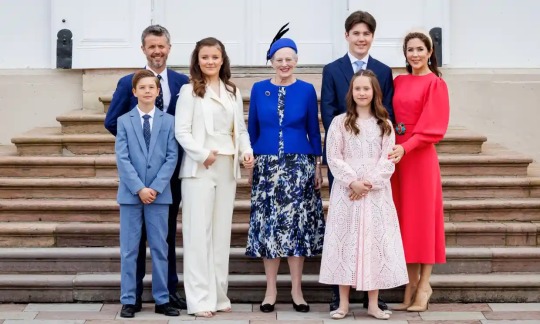
Queen Margrethe II (centre) with Crown Prince Frederik, his wife, Mary and their children (L-R) Vincent, Isabella, Josephine and Christian at Fredensborg in April 2022. Photograph: Patrick van Katwijk/Getty Images
Family name/House: The Glücksburgs
Monarch: Margrethe II
Approximate apublic Funding: £14m
On average, each Dane cycles 1.4km a day, according to the Denmark tourist board, and those cyclists include the royal family. Frederik, the crown prince and heir apparent, competed in the Tour de Storebælt cycle race near Copenhagen; he and his wife, Mary, ferry their children around town on a cargo bike.
Queen Margrethe II, 82, Europe’s longest-serving monarch, receives about 91.1m kroner a year (£10.7m) in civil list payments. The government says this covers expenses “relating to staff, operation of the royal household, administration and properties as well as the queen’s expenses of a more private nature”.
Separately, Frederik receives 22,434,876 kroner (£2.64m) a year, 10% of which goes to his wife. Frederik’s younger brother, Prince Joachim, the sixth in line to the throne, gets 3,965,400 kroner (£467,045) a year. All the money is received tax-free.
Queen Margrethe has stripped Joachim’s four children – Nikolai, Felix, Henrik and Athena – of their royal titles in a move designed to slim down the size of the family. The palace said the queen wanted to “create a framework for the four grandchildren, to a much greater degree, to be able to shape their own existence without being limited by the special considerations and obligations that a formal affiliation with the royal house as an institution implies”.
Luxembourg 🇱🇺
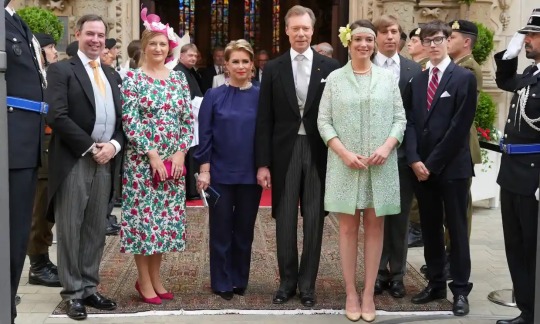
L-R: Crown Prince Guillaume, Princess Stephanie, Grand Duchess Maria Teresa, Grand Duke Henri, Princess Alexandra, Prince Louis and Prince Gabriel outside Luxembourg Cathedral in June 2022. Photograph: Sylvain Lefevre/Getty Images
Family name/House: Grand Ducal Family of Luxembourg
Monarch: Grand Duke Henri
Approximate Public Funding: £16.9m
The Windsors are not the only royals to deliver a Christmas speech. The grand duke’s message is broadcast from the yellow room in the Grand-Ducal Palace every Christmas Eve.
The latest government budget for 2023 shows payments to the Maison du Grand-Duc (House of the Grand Duke) totalled €19,257,155 (£16.9m). Of that, €15.9m (£13.9m) was spent on day-to-day expenses, and €3.3m (£2.9m) on capital projects, such as renovations.
In addition to the civil list payments for staffing costs, the grand duke and his heir receive endowments for personal expenditure: in 2022, Henri received €523,103 (£460,381) and Crown Prince Guilluame received €217,985 (£191,848).
From July, legislation drafted by the prime minister, Xavier Bettel, will peg future changes to the personal allowances to the public sector. Bettel has said the centralisation of royal funding will provide more transparency, after anger at the blurring of public and private budgets. “Now we have a monarchy that moves out of the 19th century and into the 21st century,” he said.
Norway 🇳🇴
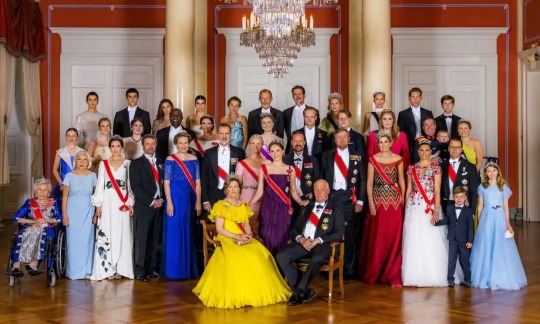
Princess Ingrid Alexandra (C) stands between her grandparents King Harald and Queen Sonja for a family photo to mark her Covid-delayed 18th birthday celebrations in Oslo in June 2022. Photograph: Lise Åserud/AP
Family name/House: The Glücksburgs
Monarch: King Harald V
Approximate Public Funding: £24m
The Norwegian monarchy dates back more than 1,000 years. Harald Fairhair is regarded as the first Norwegian king, who united several “petty kingships” into a single realm in about 885. The current king belongs to the House of Glücksburg, which has held the Norwegian throne since 1905.
The royal court’s latest annual accounts say the Norwegian royal family received 312m Norwegian kroner (£24m) in 2022 in the civil list. It is unclear how this is distributed. A previous report from 2015 states that “the king and queen and the crown prince and crown princess all receive an allowance” to cover “the management, operation, maintenance and development of the private properties and households, as well as appropriations for private expenses and official attire”.
The Netherlands 🇳🇱

(L-R): Queen Maxima, Princess Amalia, King Willem-Alexander, Princess Alexia and Princess Ariane pose at the New Church in Amsterdam in November 2022. Photograph: Koen van Weel/ANP/AFP/Getty Images
Family name/House: Van Orange-Nassau
Monarch: King Willem-Alexander
Approximate Public Funding: £44.2m
The Dutch royals are among the monarchies exempt from paying income tax. This year, the prime minister, Mark Rutte, rejected opposition demands to scrap the exemption. His government proposed an annual royal budget of €50.2m (£44.2m) for 2023.
That includes €1,035,000 (£911,162) for King Willem-Alexander, and a further €5.37m (£4.7m) to pay for his staff and other expenses. His wife, Máxima, collects €411,000 (£361,823), and an additional €700,000 (£616,245) for staff and expenses. The king’s mother, Beatrix, who abdicated in 2013, receives €1.73m (£1.52m).
Princess Amalia, the 19-year-old heir to the throne, has been granted €1.72m (£1.51m), of which €307,000 (£270,235) is salary and the rest is for staff and expenses. However, she has waived her right to the allowance, saying it would make her feel “uncomfortable” to accept it “until I incur high costs in my role as Princess of Orange”.
0 notes
Text
Ashifa Kassam at The Guardian:
Voter turnout across France has surged to a near four-decade high as voters cast their ballots in the first round of high stakes, snap parliamentary elections that could lead to the far-right party of Marine Le Pen forming a government in a historic first. While polls suggest support for Le Pen’s far-right, anti-immigrant National Rally (RN) has strengthened in recent days, the outcome of the two-round election, called three weeks ago by the president, Emmanuel Macron, following the crushing defeat of his allies in the European parliamentary elections, remains highly uncertain. With three hours remaining until polls closed on Sunday, voter turnout had reached 59.39% – an increase of nearly 20 points compared with the 2022 elections, according to the interior ministry. Turnout is estimated to be the highest since the 1986 legislative vote, the research director for Ipsos France, Mathieu Gallard, told Reuters. The high turnout is likely to mean that many more third-place candidates will make it to the second round of the election, Mujtaba Rahman, Eurasia Group’s managing director for Europe, said on social media. “Why does that matter? It allows Left and the Macron centre to make deals to withdraw (the) worst-placed candidates and allow the others a free run against the Far Right candidate in Round 2,” he wrote. The outcome of these tactical alliances could decide whether the RN “approaches” a majority in the second round, he added.
The first round of the French Parliamentary elections are today, and the far-right Rassemblement National (National Rally) are projected to be the lead party.
12 notes
·
View notes
Text
Bibliography: articles posted on this blog in 2024
Posted in January
Men Just Don’t Trust Women – And It’s A Huge Problem (Damon Young, Huffington Post, Mar 16 2015)
Amsterdam sex workers protest against plan to move red light district (The Guardian, Oct 19 2023)
They were Israel’s ‘eyes on the border’ - but their Hamas warnings went unheard (Alice Cuddy, BBC News, Jan 15 2024)
The Heteronormativity Theory of Low Sexual Desire in Women Partnered with Men (Sari M. van Anders, Debby Herbenick, Lori A. Brotto, Emily A. Harris, and Sara B. Chadwick, Aug 23 2021)
A new global gender divide is emerging (John Burn-Murdoch, Financial Times, Jan 26 2024)
The secret of OnlyFans: It’s much more than porn (Marta Biino and Madeline Berg, Business Insider, Jan 18 2024)
—
Posted in February
Half of Spanish men feel discriminated against amid feminism backlash (James Badcock, The Telegraph, Jan 16 2024)
Parisians vote in favour of tripling parking costs for SUVs (Angelique Chrisafis, The Guardian, Feb 04 2024)
Ireland kickstarts vote on constitution’s wording about women and family (Rory Carroll, The Guardian, Jan 25 2024)
Divorce rates plummet to lowest level in 50 years ‘due to cost-of-living crisis’ (Kieran Kelly, LBC, Feb 22 2024)
—
Posted in March
‘There are some really extreme views��: young people face onslaught of misogyny online (Clea Skopeliti, The Guardian, March 01 2024)
Johnson: Why men interrupt (The Economist, Jul 10 2014)
France makes abortion a constitutional right in historic Versailles vote (Kim Willsher, The Guardian, March 04 2024)
‘My self-worth plummeted every month’: the hidden disorder that can ruin women’s lives (Chloe Aslett, The Guardian, Oct 16 2023)
The tyranny of the algorithm: why every coffee shop looks the same (Kyle Chayka, The Guardian, Jan 16 2024)
DNA Tests Are Uncovering the True Prevalence of Incest (Sarah Zhang, The Atlantic, March 18 2024)
Finland is world’s happiest country for 7th year while US drops out of top 20 (France 24, March 20 2024)
Swedish pharmacy bans sale of anti-ageing skincare to children (Miranda Bryant, The Guardian, March 20 2024)
Women are being diagnosed with ADHD at unprecedented rates. Here’s why. (Kaelyn Lynch, National Geographic, Jan 16 2024)
5 Takeaways From an Investigation Into Hysterectomies in India’s Sugar Industry (Megha Rajagopalan, The New York Times, March 24 2024)
English Just ‘Badly Pronounced French’, Paris Academic Says (Tom Barfield, Barron’s, March 09 2024)
—
Posted in April
Why are women more prone to long Covid? (David Cox, The Guardian, June 13 2021)
French Revolution: Cyclists Now Outnumber Motorists In Paris (Carlton Reid, Forbes, April 06 2024)
Long Covid may be the body trying to fight off other viruses (Sarah Knapton, The Telegraph, April 08 2024)
The Troubling Trend in Teenage Sex (Peggy Orenstein, The New York Times, April 12 2024)
Sydney knifeman who targeted women ‘was desperate for a girlfriend’ (Andrea Hamblin, The Telegraph, April 15 2024)
Revealed: Israel has sped up settlement-building in East Jerusalem since Gaza war began (Jason Burke, The Guardian, April 17 2024)
‘I was only a child’: Greenlandic women tell of trauma of forced contraception (Miranda Bryant, The Guardian, March 29 2024)
Hormones and their Interaction with the Pain Experience (Katy Vincent and Irene Tracey, 2008)
—
Posted in May
Study suggests injury risk varies in menstrual cycle (Katie Gornall, BBC News, May 01 2024)
‘Urination equality’: Amsterdam women win fight for more public toilets (Ashifa Kassam, The Guardian, April 29 2024)
You can want things you don’t like and like things you don’t want (Shayla Love, Psyche, May 07 2024)
‘A new abyss’: Gaza and the hundred years’ war on Palestine (Rashid Khalidi, The Guardian, April 11 2024)
The important link between eating disorders and past trauma (Giulia Suro, Psyche, May 14 2024)
Hostile Intelligence: Reflections from a Visit to the West Bank (David Graeber, 2015)
—
Posted in June
AfD: How Germany’s far right won over young voters (Hans Pfeifer, Deutsche Welle, June 10 2024)
—
Posted in July
Coloniser le sud du Liban ? Un fantasme d'Israéliens messianiques à prendre au sérieux (Ha'Aretz via Courrier International, 3 juillet 2024)
Tampons found to contain concerning levels of arsenic and lead in world first study (Vishwam Sankaran, The Independent, July 10 2024)
South Korea politician blames women for rising male suicides (Jean Mackenzie, BBC, July 9 2024)
“Violence against women a ‘national emergency’ in England and Wales, police say (Vikram Dodd, The Guardian, July 23 2024)
—
Posted in August
Menopause was a French invention at a time of revolution (Alison M Downham Moore, Psyche, July 30 2024)
Misogyny to be treated as extremism by UK government (Helen Catt and Charlotte Rose, BBC, Aug 18 2024)
—
Posted in September
What Is Synaptic Pruning? (Jacquelyn Cafasso, Healthline, Sep 18 2018)
‘Frightening’ Taliban law bans women from speaking in public (Annie Kelly and Zahra Joya, The Guardian, Aug 26 2024)
Elon Musk suggests support for replacing democracy with government of ‘high-status males’ (Ariana Baio, The Independent, Sep 03 2024)
‘Not our tradition’: calls in Sweden to ban fathers walking brides down the aisle (Miranda Bryant, The Guardian, Aug 31 2024)
Olympic runner Cheptegei defied her violent ex. She lost her life anyway (Ammu Kannampilly, Reuters, Sep 14 2024)
—
Posted in October
The outside world knows Wim Hof as the eccentric Iceman. His family suffered domestic violence (Anneke Stoffelen and Robert van de Griend, De Volkskrant, Sep 28 2024)
The mothers who regret having kids: ‘I wished I were holding a cat and not a baby’ (Adrienne Matei, The Guardian, Sep 26 2024)
At a Loss for Words: How a flawed idea is teaching millions of kids to be poor readers (Emily Hanford, Amp Reports, Aug 22 2019)
Vu d’Allemagne. Le procès Pelicot, une honte pour tous les hommes (Leo Klimm, Der Spiegel via Courrier International, Oct 10 2024)
These Two Rape Cases Are a Lot Closer to Home Than We Like to Admit (Elizabeth Spiers, The New York Times, Sep 22 2024)
How The Netherlands Built a Biking Utopia (Michael Thomas, Distilled, March 09 2023)
It’s not just Trump v Harris: America’s men and women are also locked in battle now (Jonathan Freedland, The Guardian, Sep 27 2024)
Violences routières : « Plus on adhère aux stéréotypes masculins, plus on est enclin à prendre des risques sur la route » (Olivier Razemon, Le Monde, Oct 25 2024)
You Might Not Recover from Burnout. Ever. (Devon Price, Oct 25 2024)
—
Posted in November
Why are British teenage girls so unhappy? Here’s the answer (Caitlin Moran, The Times, Sep 13 2024)
Russia bans ‘child-free propaganda’ to try to boost birth rate (Reuters, Nov 12 2024)
My PMDD hell: why I went abroad to have my ovaries removed (Sarah Gillespie, The Times, Nov 27 2024)
—
Posted in December
Feeling nothing can be as devastating as feeling too much (Christopher J Hopwood, Psyche, Dec 12 2024)
Al helps scholars read scroll buried when Vesuvius erupted in AD79 (Ian Sample, The Guardian, Feb 5 2024)
‘We Can Bury Anyone’: Inside a Hollywood Smear Machine (Megan Twohey and Mike McIntire and Julie Tate, The New York Times, Dec 21 2024)
Telegram ‘rape chat groups’ with up to 70,000 members uncovered (Jörg Luyken, The Telegraph, Dec 19 2024)
Dreams of jewellery, phones and makeup: how young Iraqi girls are lured into marriage (Zainab al-Mashat and Maria Talal and Hala Abdullah, The Guardian, Nov 22 2024)
19 notes
·
View notes
Text
I've read that some are saying "It's a Roman salute!" and I think: how is that better?
But then there's this, from Ashifa Kassam writing for The Guardian:
"Fascist ideology in the 1920s claimed that the Roman salute – which involves placing a hand over one’s heart and then raising it upwards in a straight-armed, palm-down salute – originated in ancient Rome.
But a 2009 book by the classics professor Martin M Winkler that delved into the Roman salute found no evidence of this. 'Not a single Roman work of art – sculpture, coinage, or painting– displays a salute of the kind that is found in Fascism, Nazism, and related ideologies,' he wrote. 'It is also unknown to Roman literature and is never mentioned by ancient historians of either republican or imperial Rome.'
Instead Winkler argued that what came to be known as the Roman salute was invented in the 19th century to be used in melodramas set in the Roman empire. The gesture eventually made its way into films set in the same period, leading the myth to endure, he said."
I mean, is Mussolini a good role model, really?
Internationally?
"The Australia-based neo-Nazi Thomas Sewell also shared the video of Musk, describing it as a 'Donald Trump White Power moment.'”
Kassam's full story

^what he said
54K notes
·
View notes
Text
Women walking Camino de Santiago speak of ‘terrifying’ sexual harassment
Sexual aggression said to be ‘endemic’ on route through Spain, Portugal and France with solo female pilgrims at risk Ashifa Kassam and Mabel Banfield… Women walking Camino de Santiago speak of ‘terrifying’ sexual harassment

View On WordPress
0 notes
Text
Spain renews call for US to remove soil from nuclear accident site
Contaminated earth in Almería is result of 1966 air crash involving a B-52 loaded with hydrogen bombs Ashifa Kassam in Madrid,, 6 Mar 23 https://www.theguardian.com/world/2023/mar/06/spain-renews-call-us-remove-soil-nuclear-accident-site Nearly 60 years after a midair collision dumped four US hydrogen bombs in south-eastern Spain, strewing radioactive plutonium across the landscape, Spanish…
View On WordPress
0 notes
Text
Burning planet: why are the world’s heatwaves getting more intense?
Burning planet: why are the world’s heatwaves getting more intense?
This article titled “Burning planet: why are the world’s heatwaves getting more intense? ” was written by Fiona Harvey, Ashifa Kassam in Madrid, Nina Lakhani in Phoenix, and Amrit Dhillon in New Delhi, for The Observer on Saturday 18th June 2022 16.26 UTC When the temperature readings started to come through from Antarctic weather stations in early March, scientists at first thought there…

View On WordPress
#Amrit Dhillon#Article#Ashifa Kassam#Australia weather#Climate crisis#Drought#Environment#Extreme weather#Features#Fiona Harvey#Greenhouse gas emissions#In focus#India#Main section#Meteorology#Nina Lakhani#Observer Main#Science#Spain#The Observer#UK weather#US news#US weather#Wildfires
1 note
·
View note
Photo











209 Roman Coins Uncovered by a Hungry Badger in Spanish Cave
The ‘exceptional find’ was discovered only feet from a badger’s den in the northern region of Asturias
A trove of 209 Roman coins in a cave in northern Spain – hailed by researchers as an “exceptional find” – is believed to have been uncovered by a badger desperately foraging for food.
The coins, dating from between the third and fifth century AD, were spotted in a cave in the municipality of Grado in the northern region of Asturias. They were found mere feet from the den of a badger, months after Storm Filomena dumped heavy snow across swaths of the country.
Researchers believe that the snow forced the badger to step up its foraging efforts, leaving it prodding at a small crack near its den in hopes of uncovering berries or worms.
Instead it appears that the animal hit on a stockpile of worn Roman coins, forged in places as far away as Constantinople and Thessaloniki, archaeologist Alfonso Fanjul Peraza told El País newspaper.
Most of the coins are made of copper and bronze and the largest, weighing more than eight grams and containing 4% silver, is believed to have been forged in London.
“To date, this is the largest treasure trove of Roman coins found in a cave in northern Spain,” the researchers said in a recently published report.
It is not the first time archaeologists have uncovered treasure in the dense woodlands of Grado; about 85 years ago, 14 gold coins dating to the reign of Constantine were found in the area. “The accumulation of significant finds could – with caution – be seen as a response to the intense conflict experienced in the border territory,” said Fanjul.
The Romans conquered the Iberian peninsula in 218BC, ruling until they were ousted by the Visigoths in the early fifth century. Researchers have speculated that the latest trove of coins were likely part of a larger haul that was hastily hidden in hopes of keeping them safe amid political and social instability.
The find marks the first phase of the project, and researchers hope to return to the area for further excavations, Fanjul told reporters earlier this year. “We want to know if it was a one-off hiding place or if there was a group of humans living there.”
By Ashifa Kassam.
#209 Roman Coins Uncovered by a Hungry Badger in Spanish Cave#archeology#archeolgst#coins#ancient coins#collectable coins#history#history news#ancient history#ancient culture#ancient civilizations#roman history#roman empire#treasure#silver#bronze#copper#strange news
563 notes
·
View notes
Text
Coronavirus live news: global Covid-19 death toll passes 500,000
Coronavirus live news: global Covid-19 death toll passes 500,000
This article titled “Coronavirus live news: global Covid-19 death toll passes 500,000” was written by Clea Skopeliti (now), Aaron Walawalkar, Helen Sullivan (earlier), for theguardian.com on Sunday 28th June 2020 21.46 UTC
10.46pm BST
The UK prime minister will attempt to kick-start the economy after Covid-19 with a decade-long schools rebuilding plan, the Press Association reports.
Boris…
View On WordPress
#Aaron Walawalkar#Akhtar Mohammad Makoii#Alison Rourke#Alyx Gorman#Article#Ashifa Kassam#Australia Foreign#Australia news#Ben Doherty#Ben Smee#Clea Skopeliti#Coronavirus live#Coronavirus outbreak#Daniel Hurst#Ed Pilkington#Health#Helen Sullivan#Henry McDonald#Infectious diseases#Jamie Doward#Martin Farrer#Melbourne#Minute by minutes#News#Science#UK news#US news#Victoria#Welfare#World news
0 notes
Text
Coronavirus live news: global Covid-19 death toll passes 500,000
Coronavirus live news: global Covid-19 death toll passes 500,000
This article titled “Coronavirus live news: global Covid-19 death toll passes 500,000” was written by Clea Skopeliti (now), Aaron Walawalkar, Helen Sullivan (earlier), for theguardian.com on Sunday 28th June 2020 21.46 UTC
10.46pm BST
The UK prime minister will attempt to kick-start the economy after Covid-19 with a decade-long schools rebuilding plan, the Press Association reports.
Boris…
View On WordPress
#Aaron Walawalkar#Akhtar Mohammad Makoii#Alison Rourke#Alyx Gorman#Article#Ashifa Kassam#Australia Foreign#Australia news#Ben Doherty#Ben Smee#Clea Skopeliti#Coronavirus live#Coronavirus outbreak#Daniel Hurst#Ed Pilkington#Health#Helen Sullivan#Henry McDonald#Infectious diseases#Jamie Doward#Martin Farrer#Melbourne#Minute by minutes#News#Science#UK news#US news#Victoria#Welfare#World news
0 notes
Text
Canada-US ice hockey rivalry thaws as former captains have child together
Canada-US ice hockey rivalry thaws as former captains have child together
This article titled “Canada-US ice hockey rivalry thaws as former captains have child together” was written by Ashifa Kassam in Toronto, for theguardian.com on Tuesday 14th November 2017 19.38 UTC They have battled three times for Olympic gold, racing across the ice as part of women’s hockey’s most heated rivalry. On Monday, the former rivals – who have captained national hockey teams for…
View On WordPress
#Americas#Article#Ashifa Kassam#Canada#LGBT rights#Life and style#news#Parents and parenting#Sport#US Foreign#US News#US sports
0 notes
Text
Names of Las Vegas victims emerge as police reveal gun stockpile – as it happened
Names of Las Vegas victims emerge as police reveal gun stockpile – as it happened
This article titled “Names of Las Vegas victims emerge as police reveal gun stockpile – as it happened” was written by Matthew Weaver (now), Naaman Zhou, Sam Levin and Alan Yuhas (earlier), for theguardian.com on Tuesday 3rd October 2017 14.14 UTC
3.39pm BST
We are wrapping up this blog now. Thanks for reading. Coverage continues in our new blog:
Related: Las Vegas shooter ‘demented’, says…
View On WordPress
#Alan Yuhas#Article#Ashifa Kassam#Ben Beaumont-Thomas#Blogposts#Dominic Rushe#Eleanor Ainge Roy#Gun crime#Jamiles Lartey#Jason Burke#Justin McCurry#Las Vegas#Las Vegas shooting#Lauren Gambino#Lois Beckett#Matthew Weaver#Minute by minutes#Naaman Zhou#Nevada#News#Rachel Aroesti#Richard Luscombe#Sam Levin#Tom Phillips#UK Foreign#US gun control#US news#West Coast News#World news
0 notes
Text
Deborah Cole and Ashifa Kassam at The Guardian:
Austria’s main parties are preparing to begin tense wrangling to form a government amid warnings about the country’s democracy after the far right’s watershed victory in a general election in which angry voters punished centrist incumbents over migration and inflation. On Sunday, the anti-Islam, Kremlin-friendly Freedom party (FPÖ) scored its strongest result since its founding after the second world war by former Nazi functionaries and SS officers with just over 29% of the vote. The outcome surpassed expectations and beat the ruling centre-right People’s party (ÖVP) by nearly three percentage points. The centre-left opposition Social Democratic party (SPÖ) turned in its worst-ever performance with 21% while the Greens, junior partners in government, sank to 8%. Exit polls showed that the 13-point gain for the FPÖ since the last parliamentary election in 2019 came thanks to strong support among younger voters. Amid deep frustration with the cost of living and angst about immigration, the hard right clearly won among Austrians under 34 with 27% of that demographic, and even more decisively with the 35-to-59 set on 37%. The FPÖ profited as well from festering resentment over Austria’s strict measures during the Covid pandemic.
The FPÖ, which cites Hungary’s Viktor Orbán as a model, placed only third with over-60s on 22%. Instead, they gave their support to the ÖVP of the chancellor, Karl Nehammer, with 38%, and the SPÖ on 24%. Austria has often faced criticism about its tepid culture of historical remembrance of the Nazi period, long casting itself as the Nazis’ “first victim” despite its enthusiastic welcome of the Anschluss in 1938 by native son Adolf Hitler. In the wake of Sunday’s results, the International Auschwitz Committee, representing survivors of the Nazi extermination camp from 19 countries, denounced an “alarming new chapter” in Austria. Its vice-president, Christoph Heubner, said they were placing their faith in the “common ground among Austria’s democrats” to “stand up to historical amnesia and the ideology of old and new rightwing extremists … in the interest of the country and Europe”.
[...] Despite its resounding win, the FPÖ, which calls for a “Fortress Austria” against migration and “remigration” or forced deportations of unwanted foreigners, will face an uphill battle to form a government as it failed to secure an absolute majority. All of the smaller parties have ruled out any cooperation with the hard right. The ÖVP, which has worked with the rightwing populists several times at national and regional level, would be a potential partner but has called a government led by polarising FPÖ leader Herbert Kickl a dealbreaker.
In Austria’s election this weekend, the far-right FPO won the most seats but not an absolute majority.
#2024 Austrian Elections#Austria#2024 Elections#Freiheitliche Partei Österreich#Central Europe#FPÖ#Österreichische Volkspartei#Sozialdemokratische Partei Österreichs#Herbert Kickl#Karl Nehammer
3 notes
·
View notes
Text

‘Urination equality’: Amsterdam women win fight for more public toilets (Ashifa Kassam, The Guardian, April 29 2024)
"The need kicked in as Geerte Piening was on her way home from a bar one night in 2015.
She swiftly weighed her options: it was past closing time in Amsterdam’s lively Leidseplein area, meaning she could not duck into a bar to use their facilities, while the nearest public toilet was 2km away.
She resorted to squatting in an alleyway, coaxing her friends to cover her as she did so.
Police soon turned up, handing her a €140 (£118) fine for public urination. Few could have predicted what would come next.
After a nine-year battle for “urination equality” in which thousands took to the streets of the Netherlands, this month Amsterdam said it would open more public toilets in October.
The day after Piening was fined, she woke up furious about the injustice of it.
“There were a lot of urinals for men nearby but I couldn’t go anywhere to pee,” she said. “I thought, OK, this is an issue.” (…)
The judge also offered his own view on the issue, telling Piening that despite the lack of female facilities she should have made use of a men’s urinal. “It may not be pleasant but it is possible,” he said.
Over coffee later with her loved ones, Piening pondered the judge’s suggestion.
“We were all laughing about it because it was so ridiculous,” she said. “I think that is definitely not possible.”
Across the country, the response was much sharper. Protests began to pop up in cities across the country, calling on women to challenge the judge’s view.
“Women from across the country are invited to demonstrate the (im)possibilities of urinating in a public urinal built for men,” said the organisers of one protest coined “Power to the Peepee”.
Others posted photos online showing themselves twisted in knots and attempting ambitious gymnastic poses in order to comply with the judge’s orders, with some signed on to a petition calling on the country’s minister of education, culture and science to tackle “urination equality”. (…)
Slowly the city started to make changes, placing mobile toilets in major parks and green areas during the summer and informing the public that they could use facilities in sites such as police stations and fire halls.
But it took years to secure the ultimate victory; this month Amsterdam said new wheelchair-accessible public toilets would be available starting in October.
The exact number was not confirmed though the city said its total investment would be €4m.
Among those celebrating the news was Piening. “How do I feel about it? Really good,” she said. The past nine years had been a test of patience, one that had at times been overwhelming, she said.
But it had also been a crash course in how the design of cities – often harking back to a time when women were expected to remain in the home – can actively exclude segments of the population if left unchallenged.
“I think the city is mostly built by and for men,” she said. “So if I look at it from that angle, it isn’t surprising that there are only urinals for men.”"
9 notes
·
View notes
Text
“a little bit of a weird outcome”
From six-year-old Tibetan monk to teenage Ibiza raver: a Spanish boy’s incredible journey. Osel Hita Torres joined a monastery after the Dalai Lama declared him a reincarnated spiritual leader, but at 18 he broke free and moved to Ibiza. A new TV series tells his story. Ashifa Kassam Osel Hita Torres

View On WordPress
#Buddhism#changing direction#embracing uncertainty#Osel Hita Torres#other people’s journeys#reincarnation
0 notes
Text
#MelillaMassacre: Spain Calls for investigation over deaths in Moroccan-Spanish border crossing - Ashifa Kassam
#MelillaMassacre: Spain Calls for investigation over deaths in Moroccan-Spanish border crossing – Ashifa Kassam
Human rights campaigners in Spain and Morocco have called for investigations to be launched in both countries after a mass attempt to scale the border fence between Morocco and the Spanish enclave of Melilla left at many people were dead.Spanish officials said about 2,000 Africans made their way to the iron fence at dawn on Friday, with more than 500 managing to slip into a border control area…

View On WordPress
0 notes